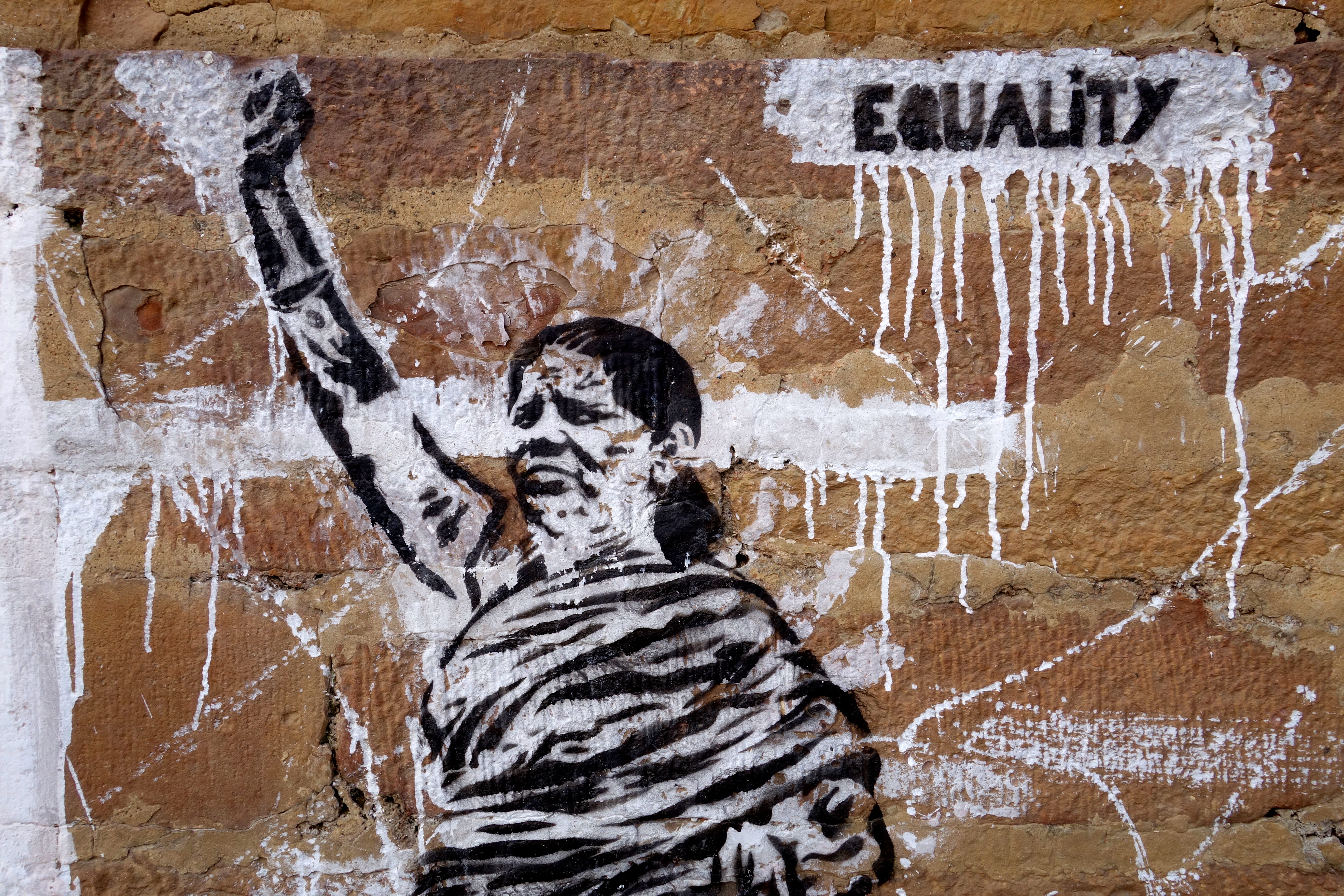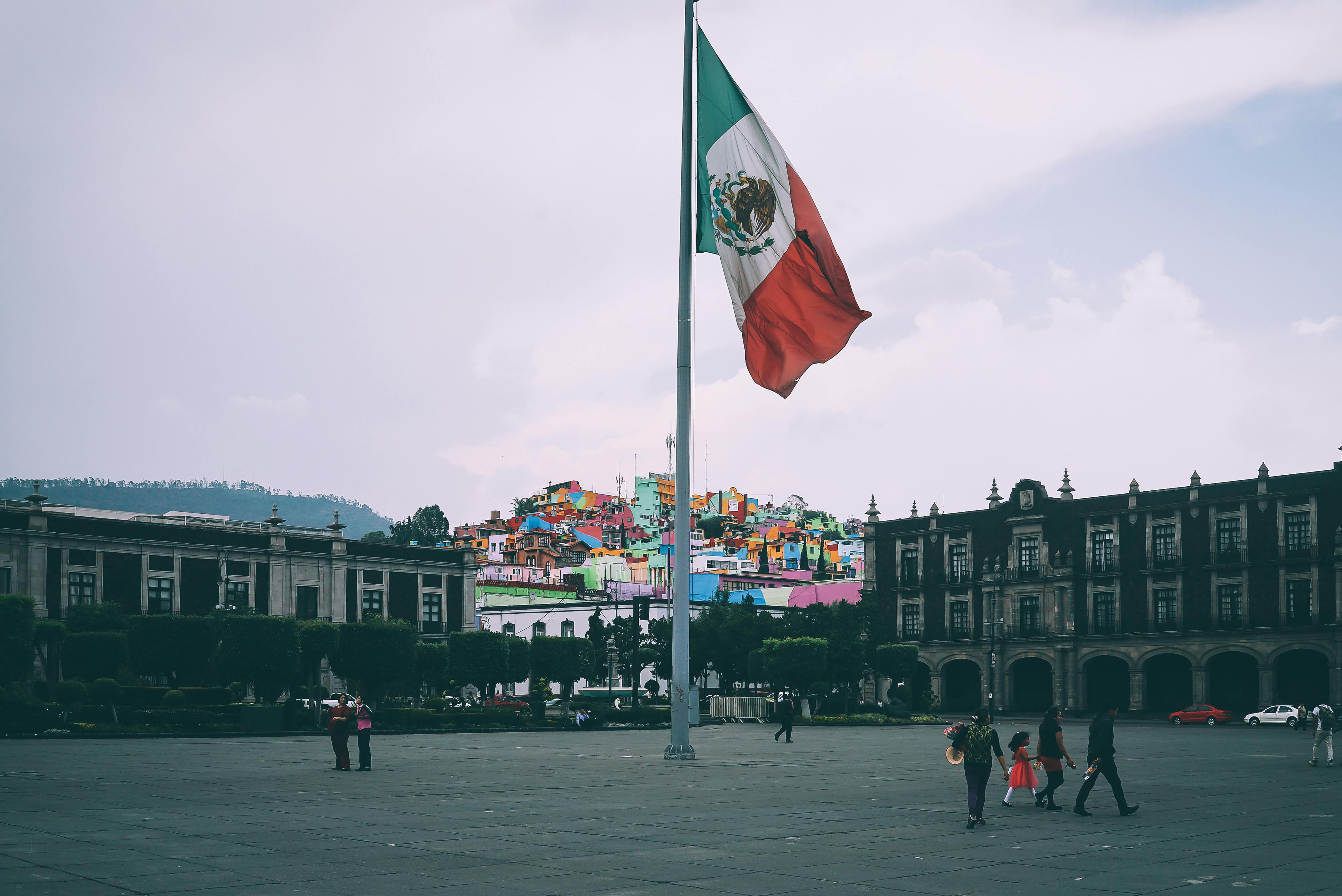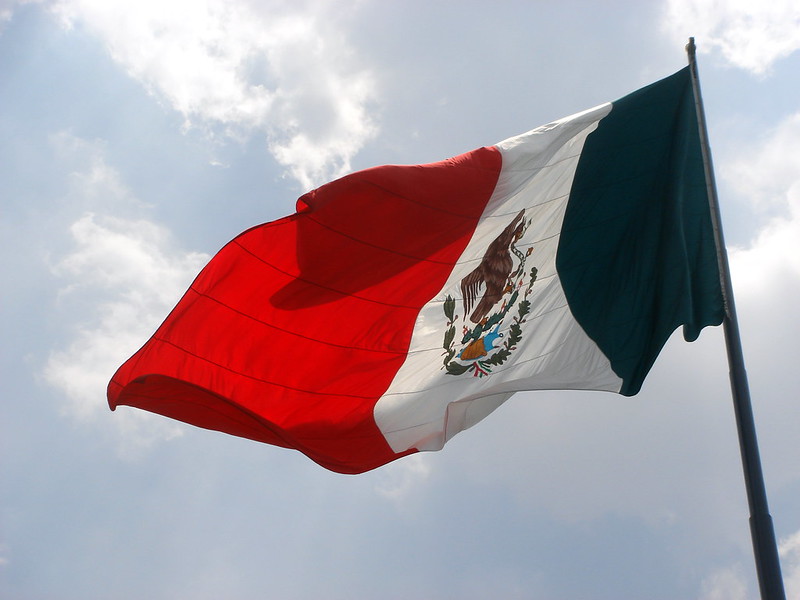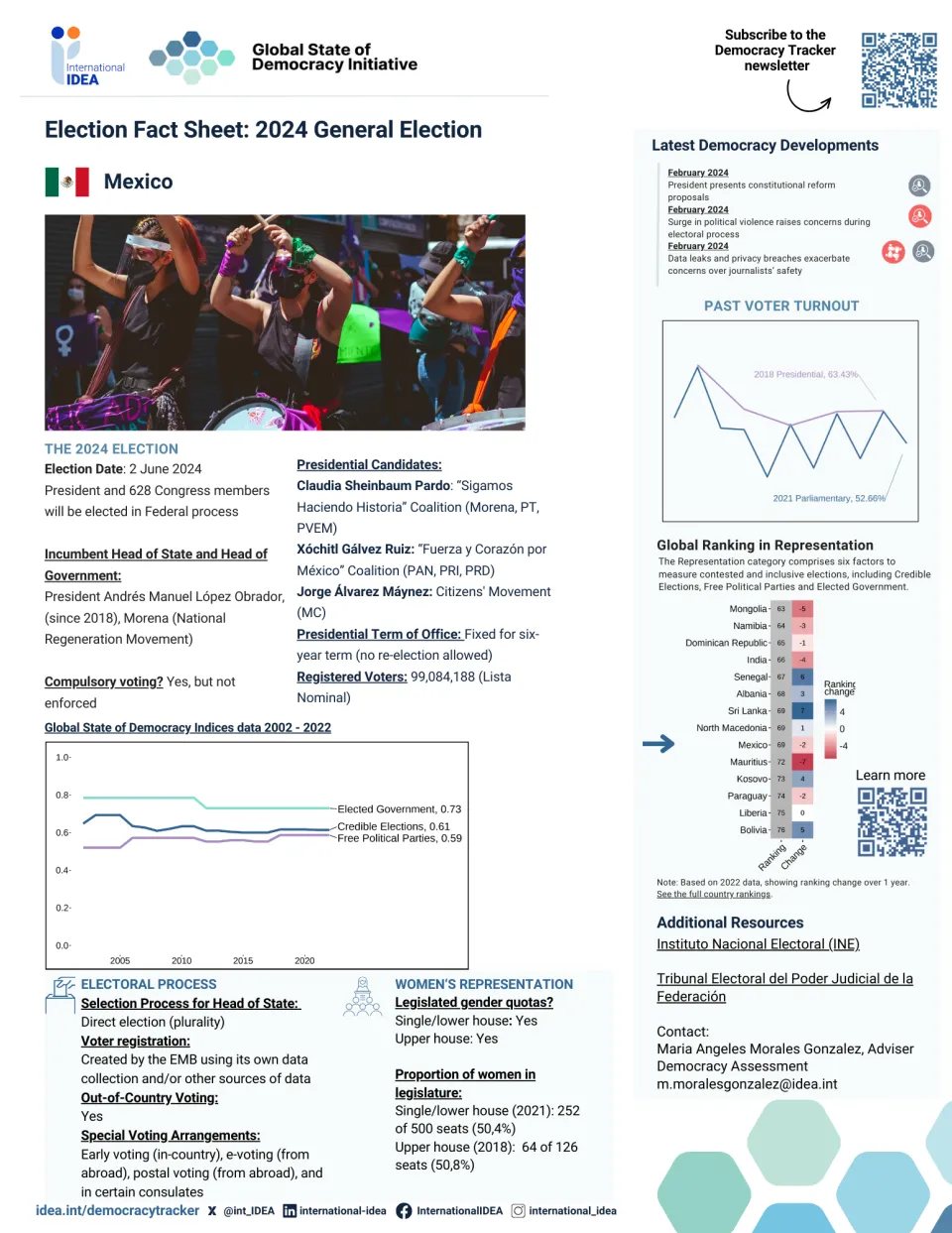
Mexico
Mexico exhibits mid-range performance in three out of four categories of the Global State of Democracy Framework (Representation, Rights and Participation), and low range performance in Rule of Law. Since 2019, it has declined in Credible Elections, Civil Liberties, Freedom of the Press, Freedom of Movement and Judicial Independence. Mexico has an upper-middle income economy and is reliant on industry, including oil and energy, manufacturing and agriculture. It has significant trade with the United States and relies significantly on remittances.
Mexico achieved independence from Spain in 1921 and is an ethnically diverse country. Mexicans are predominantly Mestizo, with Indigenous, White, and Afro-Mexican minorities. its many Indigenous peoples established social, political and religious institutions that predate colonization. Although among the 15 largest global economies, poverty affects over 36 per cent of the population. Inequality, low social mobility, and informal labour markets have a differentiated impact according to race. Indigenous peoples face structural discrimination, poverty, and obstacles to employment and public services. Free, prior and informed consent is not consistently ensured in the approval of development projects that impact their communities.
Mexico’s legal framework guarantees gender equality and LGBTQIA+ rights. Recent reforms established gender parity as a permanent fixture in all branches of government, and Mexicans elected the country’s first woman president in 2024. However, gender-based violence and femicide levels remain concerning. Same-sex marriage is legal in Mexico and the Supreme Court has paved the way for adoption by same-sex couples.
The last two decades have seen a serious downturn in domestic security as drug-related violence grows, with devastating impacts on safety and well-being. Corruption has allowed organized criminal groups to operate, wield political influence and violently meddle in elections. Illicit networks’ increased control of the country’s territory, local economies, and political system contribute to Mexico’s chronic governance challenges. After a ‘war on crime’ approach in the late 2000s, the government has attempted to contain violence by addressing its root causes and by enhancing the role of the armed forces in public security; such militarization has been criticised for its impact on human rights.
In 2000, an opposition electoral victory ended 71 years of single-party rule. After three terms of centre and centre-right leaders, however, dissatisfaction contributed to the establishment and 2018 victory of the Morena party. Its platform, focused on improving the condition of marginalized Mexicans, made it immensely popular, as officials prioritized anti-corruption and austerity measures to reduce inequality. However, government criticism and censure of the media and opposition, and executive-led initiatives to reform autonomous institutions have been characterised as eroding democratic checks on presidential authority. In 2024, a supermajority in Congress facilitated an overhaul of the judiciary, ushering in a new era of popularly elected judges and the elimination of autonomous regulatory bodies.
Looking ahead, it will be important to follow the impact of the country’s first ever judicial elections on Rule of Law and Judicial Independence. The exacerbation within the last year of cartel-fuelled violence, particularly in Mexico’s northern states, could impact Personal Integrity and Security and Civil Liberties, as the population endures forced displacement and disappearances, among other rights abuses. The media’s role as a check on power will be crucial as violence against journalists affects Freedom of the Press. The consequences of U.S. trade and migration policy on remittances and the economy will test stability in Economic Equality.
Last Updated: July 2025
https://www.idea.int/democracytracker/
November 2025
Thousands take part in anti-government protests
On 15 November, approximately 17,000 people participated in anti-government protests initially organized by Gen Z activists to draw attention to drug-related violence and corruption. Dissatisfaction had intensified following the 1 November assassination of Carlos Manzo, mayor of Uruapan in Michoacán, after he urged authorities to take a tougher stance against organized crime. The government alleged that opposition parties and their supporters used bots to amplify calls for the protest, claiming the movement was not organic but opposition-driven. While the demonstrations began peacefully, reports indicated the use of violence by a small group of protesters, including criminals who exploited the unrest to loot businesses, as well as excessive use of force by police. Officials reported around 100 police officers and 20 protesters injured. Human rights organizations documented instances of police violence against journalists and urged authorities to refrain from language that stigmatizes protesters.
Sources: Proceso, The Guardian, CBC, Al Jazeera, Cuarto Poder
Government presents plan against sexual abuse
On 12 November, President Claudia Sheinbaum presented an executive plan to combat sexual abuse. The plan, which would require some legislative changes, includes: standardizing the legal definition of sexual abuse as a serious crime; strengthening mechanisms to encourage women to report cases; enhancing training for prosecutors and public officials; and launching public awareness campaigns aimed at driving cultural change. During the announcement, President Sheinbaum referenced her own recent experience, in which a man groped her while she was speaking with citizens on the street—an incident that intensified public outrage over the country’s high rates of sexual and gender-based violence.
Sources: Gobierno de Mexico, El Pais, The Guardian
July 2025
New telecoms and intelligence bills raise privacy concerns
In July, a significant legislative package was introduced in Mexico, including the new Federal Telecommunications and Broadcasting Law and a Law on the National Research and Intelligence System for Public Security. The telecommunications law establishes a Digital Transformation and Telecommunications Agency to expand internet access to marginalized communities but has raised privacy concerns. While judicial orders are required to access private communications, real-time geo-location does not require judicial approval. It also mandates the use of biometric ID when obtaining a mobile number, accessing certain services, or engaging in e-commerce. Separately, compulsory biometric identification was introduced through amendments to the General Law on Enforced Disappearances and the General Population Law, meaning that individuals must provide biometric data for official population records and civil registration purposes. Critics argue both measures lack sufficient privacy safeguards. Additionally, the intelligence law allows linking public and private databases, which privacy advocates warn could undermine rights without proper oversight.
Sources: La Jornada, Vanguardia, Diario Oficial de la Federacion, Proceso, El Pais
June 2025
First judicial elections take place, but voter turnout is low

Mexico’s first judicial elections took place on 1 June, following constitutional amendments to overhaul the judiciary. Ballots included candidates for most federal judgeships, including all seats on the Supreme Court, Electoral Tribunal and the newly created Judicial Discipline Tribunal. Elections of local judges also took place in 19 of the 32 states, with the remaining states still working to amend their local constitutions to allow for judicial elections.
Voter turnout was approximately 13.0 per cent, and to fulfill constitutional requirements for gender parity, citizens elected five women and four men to the Supreme Court. Other federal judgeships were filled under the same principle. Mexico is the only country to elect all its judges by popular vote.
An OAS electoral observation mission noted difficulties in the preparatory process due to limited time for implementing the judicial reform and noted complaints about 'cheat sheets' promoting specific candidates distributed by some parties and local officials.
Sources: Instituto Nacional Electoral, Organization of American States, Voz y Voto, International IDEA
February 2025
Cartel leaders are transferred to the U.S., bypassing extradition procedure
On 27 February, 29 cartel leaders and members (most, Mexican nationals), wanted in the United States for crimes such as money laundering, drug trafficking and organized crime were transferred to that country, bypassing the extradition process. According to the Mexican Attorney General (AG) and the federal Security and Citizen Protection Minister, the cartel leaders were ‘sent’ or ‘transferred’, pursuant to Mexico’s National Security Law and article 89 of the Constitution. The officials clarified the cartel leaders had not been extradited, but transferred following a decision of the National Security Council in response to a U.S. request. They defended this procedure, blaming corruption in the judiciary for the delay in resolving extradition requests, given that injunctions and appeals meant that some cases had been ongoing for many years. The decision is atypical, both for the legal basis invoked and Mexico’s long-established demand that any nationals subject to extradition requests are spared the death penalty. Although the AG asserted that capital punishment would not be pursued in the criminal cases, U.S. prosecutors have not given such assurances publicly.
Sources: : Gobierno de Mexico, Expansion Politica, El Pais, Reuters, NY Times, El Universal
See all event reports for this country
Global ranking per category of democratic performance in 2024
Basic Information
Human Rights Treaties
Performance by category over the last 6 months
Blogs
Election factsheets
Global State of Democracy Indices
Hover over the trend lines to see the exact data points across the years
Factors of Democratic Performance Over Time
Use the slider below to see how democratic performance has changed over time




